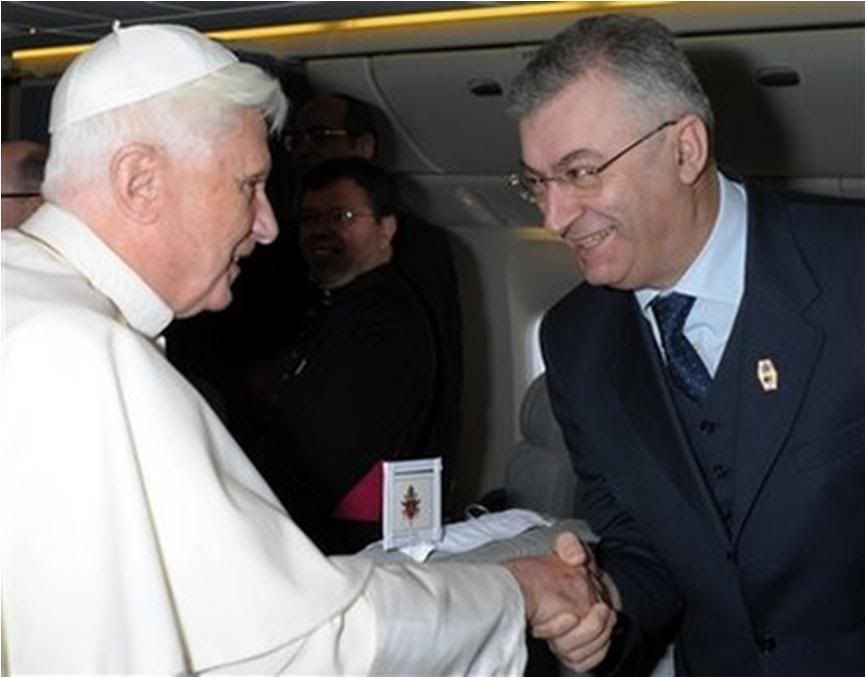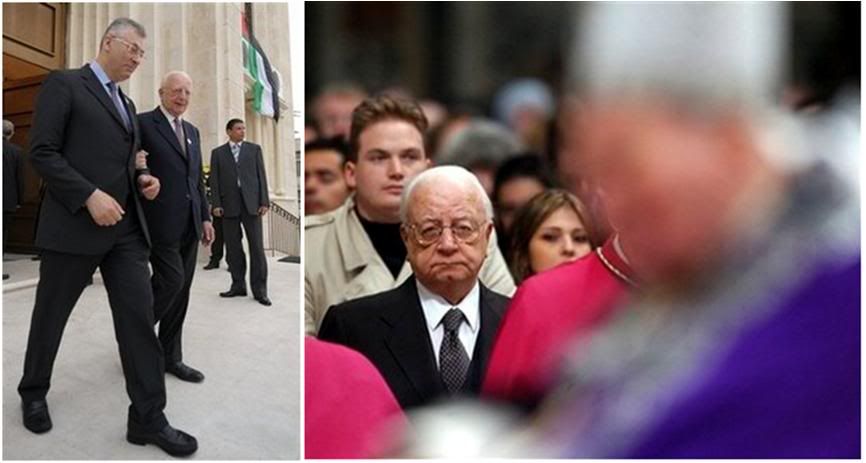 I posted this on my starter post this morning in NEWS ABOUT BENeDICT but it really belongs here primarily.
I posted this on my starter post this morning in NEWS ABOUT BENeDICT but it really belongs here primarily.
Dar Dr. Polisca, you know you are possibly the most important man to have on hand around our beloved Pope! Please make him watch the calories, and can you get him to use his stationary bike too?
Pope has new personal physician;
Dr. Buzzonetti retires

June 15, 2009
 Dr. Polisca with the Pope enroute to Cameroon last March
Dr. Polisca with the Pope enroute to Cameroon last March.
The Holy Father has named Dr. Patrizio Polisca, 55, to be vice-director of the Vatican State's Department of Health and Hygiene, sas well as his new personal physician.
In the latter position, Dr. Polisca succeeds Dr. Renato Buzzonetti, 84, who is retiring after serving as personal physician to four Popes, starting with Paul VI (he was also Cardinal Ratzinger's personal physician).
 Left photo: Drs, Polisca and Buzzonetti in Jordan last month during the Pope's trip; and right, Dr. Buzzonetti watching the late John Paul II pass by.
Left photo: Drs, Polisca and Buzzonetti in Jordan last month during the Pope's trip; and right, Dr. Buzzonetti watching the late John Paul II pass by.
Dr. Polisca. along with Dr. Buzzonetti, has accompanied Benedict XVI during all his trips abroad so far.
Dr. Buzzonetti will have the title of Emeritus Archiatra [
archiatra is a Greek term which means 'lead physician'].
He was coauthor of a book, with John Paul's longtime private secretary Cardinal Stanislaw Dziwisz, on John Paul's suffering and how he dealt with his infirmity. He signed the Pope's death certificate.
More on Dr. Polisca from CNS:
Pope chooses cardiologist
as new personal physician

VATICAN CITY, June 15 (CNS) -- Pope Benedict XVI has chosen as his new personal physician a cardiologist with strong ties to the Vatican.
Dr. Patrizio Polisca, a professor of cardiothoracic surgery at Rome's Tor Vergata University and president of the commission of physicians who serve as consultants to the Congregation for Saints' Causes, was named personal physician to the Pope and vice director of the Vatican health service June 15.
Dr. Polisca, 55, succeeds 84-year-old Dr. Renato Buzzonetti, who became personal physician to Pope John Paul II in 1978 and continued as the personal physician to Pope Benedict.
The personal physician travels with the Pope on all his foreign trips; for the past nine years, Dr. Polisca has joined Dr. Buzzonetti on the papal flights as his assistant.
Buzzonetti, a specialist in gastroenterology and hematology, served as director of the Vatican health service from 1979 until 2005, when Pope Benedict named Dr. Giovanni Rocchi, a professor specializing in infectious diseases at Tor Vergata University, to the position.
New papal physician explains
doctors' role in sainthood process
By Cindy Wooden

VATICAN CITY, June 15 (CNS) -- The path to sainthood passes through a team of physicians, who pore over medical texts, patient charts and test results to make sure a healing is medically inexplicable.
That does not mean the medical experts declare a miracle, because "the recognition of a miracle is not a matter for medical science," said Dr. Patrizio Polisca, president of the group of physicians who serve as consultants to the Vatican Congregation for Saints' Causes.
The doctor wrote about the physicians' role in the sainthood process in the June 13-14 edition of
L'Osservatore Romano, the Vatican newspaper. The Vatican announced June 15 that Polisca, a cardiologist, was named Pope Benedict XVI's personal physician.
Writing about sainthood causes, Polisca said that while medical science and knowledge have changed enormously in the past few decades, the criteria for miraculous healings still follow those laid out 275 years ago by Cardinal Prospero Lambertini, the future Pope Benedict XIV.
The cardinal had insisted that the illness or defect be serious, incurable or extremely difficult to treat; that spontaneous cures were not known to occur in similar illnesses; that no medical intervention used in the case could explain the cure; that the cure was unexpected and instantaneous; and that it was complete and lasting.
Polisca said the role of the physicians is not to declare a miracle, but rather to determine whether an alleged healing could have a natural or a medical explanation.
If the absolute majority of the members of physicians' commission vote that a healing has no natural or scientific explanation, the case is passed on to a commission of theologians who determine whether the healing could have been the response to a prayer request for the intercession of the sainthood candidate.
In the case of Catholic martyrs, only one miracle is needed for canonization. For sainthood candidates who were not killed out of hatred for the faith, one miracle is needed before beatification and a second is needed before canonization.
Polisca said the Vatican's medical consultants represent a wide variety of specialties because it is essential that they are able to understand the patients' medical records, the medical tests performed, the diagnosis and original prognosis, the normal course of the illness in question and any therapies attempted.
The fact that a person is healthy in the end does not guarantee a judgment in favor of a miracle if the medical consultants believe the diagnosis was wrong or that the cure was a result of a medical intervention, he said.
In addition, he said, the testimony of medical personnel and family members who assisted the person before the healing also may be examined to confirm the original diagnosis and the unexplainable nature of the cure.
"All of this is done in order to examine the compatibility of the healing with what is known of the natural course of the illness being studied" or of the therapeutic measures taken before the healing was reported, Polisca said.
His piece was part of a collection of articles in the Vatican newspaper marking the 40th anniversary of the current structure of the Congregation for Saints' Causes.
[Modificato da TERESA BENEDETTA 16/06/2009 20:16]